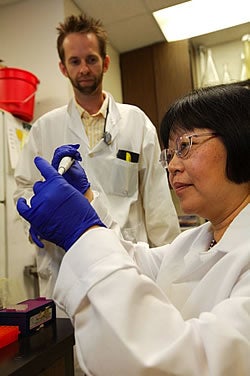Research could lead to new blood pressure treatment
Funded by a $1.6 million grant, an East Carolina University researcher is studying a protein that might hold a key to reducing high blood pressure and improving kidney function in people with kidney disease.
Dr. Yan-Hua Chen, an associate professor of anatomy and cell biology at the Brody School of Medicine at ECU, has received the five-year grant from the National Heart, Lung, and Blood Institute, part of the National Institutes of Health, to study the function of claudin-7, a protein that makes up part of the barrier that controls the flow of molecules between cells.

Dr. Yan-Hua Chen works in her lab as research specialist Rodney Tatum looks on. Photo by Cliff Hollis
Chen’s preliminary research has shown that claudin-7 interacts with an enzyme called WNK4 kinase and forms a pathway for chloride ions to enter the bloodstream. Interaction of claudin-7 with a mutated version of WNK-4 may lead to high blood pressure.
Understanding the role of claudin-7 in these intercellular barriers and pathways could lead to medicines that could help people with high blood pressure as well as kidney disease, Chen said. It could also help people whose blood pressure is too low.
“We need to find out the mechanism of this claudin-7 in the control of ionic balance in the body,” Chen said. “The next five years will be very exciting for us.”
Chen began her research with grants last year from the ECU Division of Research and Graduate Studies and the N.C. Biotechnology Center, which allowed her to collect necessary data to revise and resubmit her federal grant request.
Chen is working with fellow ECU scientists Dr. Qun Lu of the Department of Anatomy and Cell Biology and Dr. Abdel Abdel-Rahman of the Department of Pharmacology and Toxicology on the claudin-7 study. In another study involving the protein, she is working with Dr. Kathryn Verbanac, a scientist in the ECU Department of Surgery, to discover how claudin-7 might suppress tumors in lung cancer. That research is funded by a $143,271 grant from the National Institute of Environmental Health Sciences of NIH.